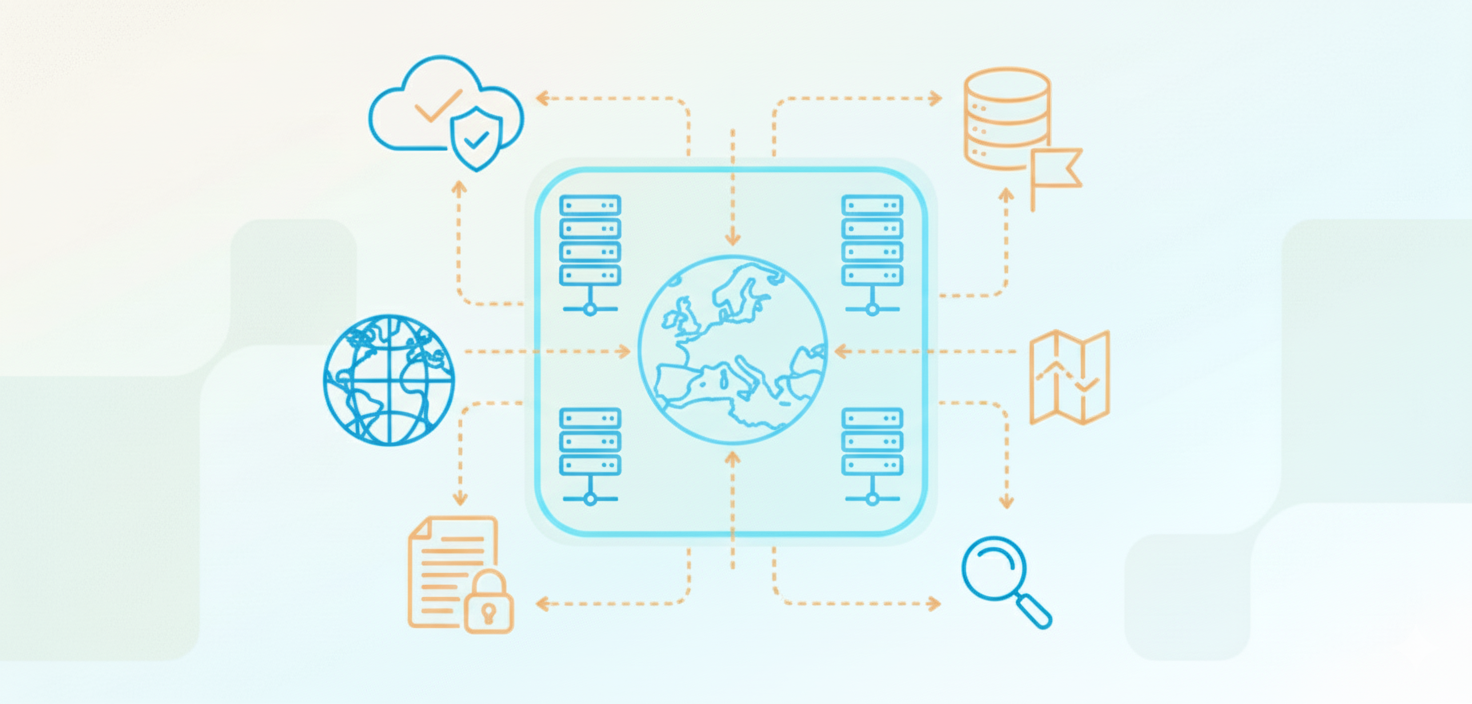법률 및 규정 준수
데이터 레지던시(Data Residency)란 무엇인가요?

데이터 레지던시(Data Residency)란 무엇인가요?
데이터 레지던시는 조직의 데이터가 위치하는 지리적 영역을 정의합니다. 이는 특히 개인 데이터를 포함한 특정 유형의 데이터가 자국 국경 내에 저장되도록 요구하는 법률을 가진 국가 및 지역이 많기 때문에 중요합니다.
데이터 상주 규정 준수는 현지 데이터 보호, 개인 정보 보호 및 보안 법규 준수에 필수적이며, 조직이 벌금을 피하고 고객 신뢰를 유지하도록 보장합니다.
데이터 상주가 왜 중요한가요?
데이터 상주는 유럽의 GDPR과 같은 현지 규정 준수를 가능하게 하므로 중요합니다.
동시에:
- 규정 미준수는 재정적 벌금과 법적 파급 효과를 초래할 수 있습니다.
- 보안 강화는 종종 데이터 스토리지 제어와 연관됩니다. SaaS 비즈니스는 접근 제어 및 암호화와 같은 다양한 보호 조치를 마련함으로써 민감한 정보에 대한 무단 접근 위험을 크게 줄일 수 있습니다.
- 데이터 상주 규제에 대한 관심은 고객 신뢰도 수준과 연관될 수 있으며, 특히 국제적인 데이터 흐름이 만연한 점을 고려할 때 비즈니스 활동 및 대중의 인식에 잠재적인 영향을 미칠 수 있습니다.
데이터 상주와 데이터 주권의 차이점은 무엇인가요?
주요 차이점은 다음과 같습니다:
- 데이터 레지던시는 데이터가 위치한 곳에 따라 달라집니다.
- 데이터 주권은 해당 데이터를 둘러싼 법적 문제에서 비롯됩니다.
- 데이터 주권은 단순히 데이터가 위치한 국가의 법률 및 규정에 따라 해당 국가의 통제하에 있음을 의미합니다.
- 데이터 레지던시를 이해하는 것은 한 국가의 법률이 자국 국경 내의 데이터에 적용되기 때문에 데이터 주권을 결정하는 데 도움이 됩니다.
기업은 국제법을 준수하고 데이터 관련 법적 문제(여파)를 피하기 위해 두 가지 개념을 모두 인지해야 합니다.
일반적인 데이터 상주 규정은 무엇인가요?
데이터 상주법은 데이터가 어디에 저장되고 처리되어야 하는지에 대한 기반을 마련합니다.
- GDPR, 유럽의 일반 데이터 보호 규정
- CCPA, 캘리포니아의 소비자 개인 정보 보호법
- LGPD, 브라질의 개인 정보 보호법
이러한 규정들은 금융 및 헬스케어와 같은 산업에 상당한 영향을 미치며, 데이터 저장 및 처리가 현지 법률을 준수하도록 요구합니다.
GDPR이 데이터 상주에 미치는 영향은 무엇인가요?
GDPR은 민감한 정보가 EU 내에 보관되어야 한다고 특별히 요구하지는 않지만, GDPR과 관련하여 기업들이 배치하는 정보 자산의 위치에 영향을 미치며, 이는 본질적으로 국경을 넘어 정보를 전송하는 특정 방법을 금지합니다.
EU 시민에게 서비스를 제공하는 전 세계 조직은 GDPR을 준수할 의무가 있으며, 이는 데이터 저장 및 처리 위치 문제를 야기합니다.
GDPR의 데이터 전송 규칙을 따르는 것은 조직의 본거지와 관계없이 데이터 보호 수준 및 고객 신뢰와 관련이 있습니다.
GDPR의 국경 간 데이터 전송 규정은 영국 데이터 보호법의 규정과 유사하게, 충족되지 않을 경우 재정적 처벌 및 평판 손상으로 이어질 수 있는 규정 준수 요건을 제시합니다.
데이터 레지던시와 관련된 주요 과제는 무엇입니까?
개인 정보 처리에 관한 규정은 SaaS 기업들에게 지속적인 변화를 보여주고 있습니다.
또한, 위치 프라이버시 측면에서 전문적인 IT 전문 지식의 필요성이 증가하고 있습니다.
다양한 데이터 레지던시 요구사항을 충족하기 위한 다중 지역 배포의 운영 복잡성은 압도적일 수 있으며, 비용과 관리 오버헤드를 모두 증가시킵니다.
규정 준수에 드는 높은 비용은 신제품 및 새로운 사업 영역에 대한 투자를 저해하고 있습니다. 이는 기업의 민첩성과 성장 능력을 저해합니다.
SaaS 기업은 데이터 레지던시 요구사항을 어떻게 준수할 수 있습니까?
SaaS 조직이 데이터 레지던시 규정 준수를 달성하기 위해 따를 수 있는 단계별 프로세스는 다음과 같습니다:
- 사용자가 위치한 지역과 처리하는 정보 유형에 대한 모든 관련 데이터 상주 법규를 파악하십시오.
- 해당 지역에 데이터 센터를 배치하거나 지역 데이터 스토리지를 제공하는 클라우드 서비스를 이용하십시오.
- 데이터 거버넌스 관리를 위한 강력한 정책을 수립하십시오. 여기에는 다음이 포함됩니다. 암호화, 접근 제어, 그리고 감사 추적, 규정 준수를 보장하기 위해
- 다음과 같은 출처의 통찰력을 고려하여 규정 준수 조치를 정기적으로 검토하고 업데이트하십시오. Digital Guardian 현지 보안 표준의 이점을 고려하고, 데이터 상주 규정 준수를 유지하기 위해 변화하는 규제에 적응합니다.
결론
SaaS 데이터 레지던시는 점점 더 규제가 강화되는 글로벌 환경에서 운영하는 SaaS 기업에게 중요한 고려 사항입니다. 규제 준수를 위해서는 데이터 레지던시와 데이터 주권의 미묘한 차이를 이해하고 GDPR, CCPA, LGPD와 같은 규정을 준수해야 합니다. 데이터 레지던시를 우선시함으로써 SaaS 기업은 법적 및 재정적 고려 사항을 해결하는 동시에 고객 신뢰와 시장 입지에 잠재적으로 영향을 미칠 수 있습니다.